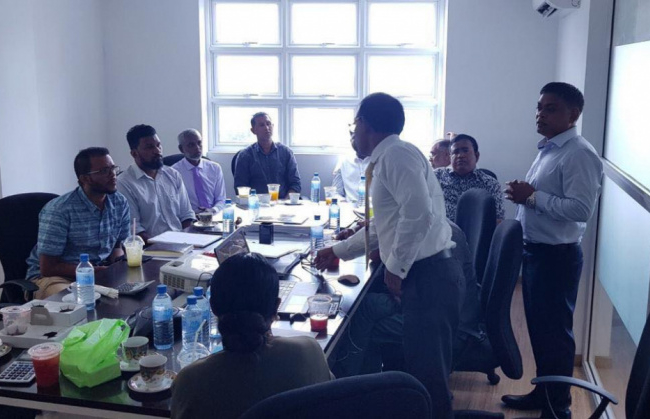Malé, Maldives – Supreme Court today has repealed a sentence ordering the state to pay MVR 348 million in damages to Dheebaja Investment Pvt Ltd.
The state contracted Dheebaja to provide ferry services in the Northern Province in 2011, when former President Mohamed Nasheed was in office. However, after President Abdulla Yameen Abdul Gayoom’s administration terminated the contract in 2013, Dheebaja filed a lawsuit demanding the government to pay MVR 348 million to the company as compensation and proceeded to win at the Civil Court.
The government terminated the contracting stating that Dheebaja had violated some terms of the contract, although the company was never provided land mandated by the contract to be used to develop a resort and a ferry terminal.
The Civil Court initially ordered the government to pay a sum of MVR 348 million as compensation to Dheebaja in 2014, during President Mohamed Nasheed’s time in office.
This ruling, however, was overturned by the High Court in 2018, only to be annulled by the Supreme court in April 2019 on the grounds that the appeal was accepted two months after the deadline passed.
Earlier in 2020, the Attorney General’s Office requested the Supreme Court to review its earlier verdict on the Dheebaja case upon the request of incumbent President Ibrahim Mohamed Solih.
In July 2020, Auditor General Hassan Ziyath refuted an out-of-court settlement with Dheebaja Investment Pvt Ltd and the government, claiming that the contract was terminated after the company breached the agreement, accusing the company of being negligent to its duty to uphold the agreement and that government was not liable to pay any compensation.
Supreme Court today stated that the matter was appealed 2 months after the deadline due to negligence by the state, and that this cannot be considered as reasonable justification. They added that Supreme Courts previous ruling did not explicitly state whether a settlement was to be paid to Dheebaja or not.
The Supreme court declared that their previous verdict repealing the High Court’s 2018 sentence was an incorrect ruling and that the Supreme Courts earlier sentence has been annulled based on these issues.
This means that the High Court’s sentence against Dheebaja now stands, but can be appealed at the Supreme Court if Dheebaja chooses to do so. The court has given Dheebaja 15 working days from the day of sentencing to appeal this decision.
During the hearings of the case review, Supreme Court bench had pointed out various discrepancies between the state and Dheebaja in the out of court settlement in which Dheebaja had agreed to settle the case for MVR 174 Million, even though the Supreme Court had previously ruled that MVR 348 Million was to be paid.
Dheebaja representative Mohamed Haleem said that the amount was reduced “as a gift for the people” and that a reduction in the amount cannot be used as an excuse to not pay at all.
Haleem asserted that it was not legally permissible to review verdicts after the deadline for submitting appeals had expired and that such cases could only be reopened in circumstances that raise considerable suspicions of injustice or involve systematic procedural issues.
Lawyer Mohamed Faisal added that the government had previously agreed in court that it failed to submit the appeal to the High Court within the allotted time period due to the negligence of the lawyer assigned to the case and inquired the state representatives whether a system to monitor lawyer’s work at the Attorney Generals Office was not in place and if the lawyer in question was not requested to appeal the case.
He also urged the state to provide an adequate reason as to why the Supreme Court was currently reviewing a case for which a verdict was already announced, and that the state attempting an out-of-court settlement with Dheebaja was proof that the Supreme Court’s verdict was accepted by the government.
State representatives claimed the appeal failed to lodged within the allotted time period due to delays in receiving reports from the Civil Court, and defended the High Court’s acceptance of the case in 2018. Noting that the the Judicature Act permitted the acceptance of appeals after the expiry of the allocated period, provided that there was a justifiable reason for delays.
The bench then explained that they can only review a verdict handed out by the supreme court if there is a very clear discrepancy in the case and asked state representatives if such an issue was present in the supreme courts previous ruling.
The state representatives responded that there was no clear indicator of how the damages were calculated by Dheebaja and that the Supreme Court gave their verdict without reviewing many key points, which they believe to be be a huge discrepancy.
Dheebaja representative Haleem refuted these claims, saying the damages were calculated by a well known audit firm after taking into account the time period stated in the contract between Dheebaja and the Maldivian Government.
Supreme Court Justices who sat on the bench of the case were Justice Aisha Shujoon Mohamed, Justice Dr. Azmiralda Zahir and Justice Dr. Mohamed Ibrahim.





